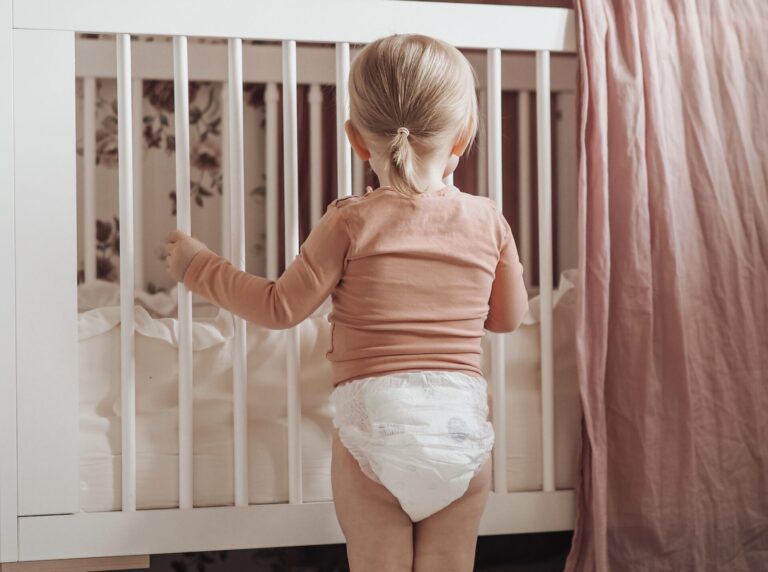As a parent, you may find that your 1-year-old child’s sleep pattern changes suddenly. This change is called sleep deprivation, also known as sleep regression, and can be a confusing and exhausting experience for both the child and the parents. This article discusses why such a change occurs and gives practical advice on how to deal with the situation and support your child’s sleep rhythm at this stage.
Changes in the sleep patterns of a 1-year-old
Parents may notice a change in sleep rhythm in a 1-year-old child, suggesting a shift from daytime sleep to a more night-time-oriented rhythm. At this stage, the duration of daytime naps may become significantly shorter and nocturnal sleep disturbances may become more common. This change in sleep rhythm can be influenced by a variety of factors, such as the child’s growth and development, the onset of teething or a change in the child’s own sleeping pattern.
The child’s need for sleep may also change at this stage. This can make it more difficult to stay awake during the day and at the same time allow for several night time awakenings. This natural but challenging phase of change can be challenging for both the child and the parents. Understanding how a 1-year-old’s sleep rhythm changes and how it affects the child’s daily life will help parents support their child in the best possible way when it comes to sleep and deal with various health issues related to sleep.
Signs and symptoms of 1-year-olds sleep deprivation
Sleep deprivation is a phenomenon that can be identified based on certain signs and symptoms. For a 1-year-old, these signs may include weaker sleep quality, restless naps, difficulty falling asleep, and night awakenings. The child may exhibit more irritable and tearful behavior than usual, and this abnormal behavior may continue for several weeks. Due to sleep challenges, the child’s appetite may also decrease. It is common for the child to wake up more often at night and may need the parents’ help to fall asleep again. Evening routines, such as evening meals and evening activities, can become more stressful than usual for both the child and the parents. It is important to recognize these signs early and offer support to the child through this sleep challenge, so that it does not negatively affect the quality of sleep and well-being of the child or the whole family.
Sleep deprivation can be very different for a 2-year-old child. Find out more about sleep deprivation in a 2-year-old here!
Sleep regression is a normal part of a child’s development and usually does not signify anything serious.
The role of parents during sleep regression
The role of the parents is crucial with sleep regression of a 1-year-old. Although this period may be challenging for both the child and the parents, parental support and understanding can help the child get through this phase.
First, it’s important to recognize that sleep regression is a normal part of a child’s development and usually doesn’t signify anything serious. Secondly, during sleep regression it is useful to keep the family routine as much as possible to make it easier for the child to adapt to the changes. This can mean, for example, the same evening routine and bedtime as before sleep deprivation. Third, a constructive and understanding approach will help the child overcome this sleep challenge. It is also important to deal with this sleep challenge patiently and calmly so as not to add to the child’s stress.
Practical ways to manage sleep deprivation in a 1-year-old
There is no one “right” way to deal with sleep regression, because the child’s temperament and sleep rhythm affect which method works best. The biggest goal is to get the child to return to their former, peaceful sleep rhythm. Often, small changes to nap time can help. For example, a shorter nap time can improve the quality of night sleep. It is worth trying to shorten the nap by, for example, 15 minutes at a time and watch how the child reacts to this change.
Another concrete way is to keep the child’s afternoon and evening routines as similar as possible, even if the child is more tired and irritable than before. In fact, familiar routines may help calm a child and prepare for sleep, even if sleep deprivation is happening. To improve the quality of sleep, it is also recommended to keep the child’s bedroom dark and cool enough, as these factors can help the child fall asleep and stay asleep. It is important for parents to approach sleep deprivation with patience – remember, this is only temporary.
More tips for better sleep for your child can be found here!

Management of night awakenings during sleep deprivation
Night awakenings are one of the most significant symptoms in a 1-year-old’s sleep deprivation. The child may have difficulty falling back to sleep after nighttime awakenings and may need parental comfort or help. This can lead to shorter and weaker night’s sleep for both the child and the parents. It is important for parents to remember that night wakings are a normal part of a child’s development. Parents should maintain calmness and regularity when the child wakes up at night. If necessary, a calming ritual can be used, such as gentle stroking or hand holding, but at the same time it is important that the child learns to fall asleep again independently.
By using proactive parenting, you can think in advance how to react to wakings and act consistently. Night visits to the child’s place should be kept short and calm, so that the child learns that the night is meant for sleeping. If the night awakenings continue for a long time and cause significant stress to the child or the parents, it is recommended to seek help from a counseling center or a doctor, as the underlying cause may be more than normal sleep deprivation.
Changing sleeping habits and their effect on sleep deprivation
During sleeping challenges, it can be tempting to try new sleeping habits to help your child sleep better. However, new sleep habits, such as going to bed later or taking more naps, are not necessarily the best solution during sleep deprivation.Changing sleep habits can, on the contrary, confuse the child’s sleep rhythm even more and make the sleep regression last longer.A good rule of thumb is to stick to the same evening routines and bedtimes as before sleep deprivation.
Routines create a sense of security and help the child understand when it’s time to sleep. If necessary, you can consider changing the routines a little, for example by moving bedtime a little later or shortening naps, but big changes should be postponed until the sleep deprivation is over. Also remember that every child is an individual and therefore what works for one may not necessarily work for another. Ultimately, your child will help you figure out what sleep habits work best for them. It may take time and patience, but it’s worth it.
You can also find out here how to react to sleep deprivation in an 8-month-old baby!
The most important aspect is supporting the child’s well-being and understanding the changes in the child’s sleeping needs.
How sleep deprivation affects the family’s everyday life
Sleep deprivation can challenge the family’s normal rhythm and cause fatigue, both for the child and the parents. You will probably notice that the family’s daily routines are mixed and the child’s behavior is more irritable than usual. This can cause extra stress and may even weaken the parents’ mood and ability to cope. It is important to understand that although sleep deprivation can be a challenging time, it is only a temporary phase in a child’s development. The role of parents is to be supportive and patient with changes in sleep patterns.
Everyday life may require flexibility and sometimes, for example, family dinners or morning routines may have to temporarily give way to better sleep – but let’s remember that it’s only temporary. Despite the difficult periods, the most important thing is to remember that such sleep disturbances are a normal part of a child’s development and should not last very long. The most important aspect is supporting the child’s well-being and understanding the changes in the child’s sleepings needs. At the same time, parents should also remember to take care of their own well-being during this period.
How do Moomin Baby diapers support your baby’s sleep?
Moomin Baby diapers can significantly improve a child’s nighttime sleep and thus help control sleep deprivation. The diapers are designed to be particularly breathable and effectively retain moisture, and above all to be safe and pleasant for the child’s skin. They do not contain harmful chemicals or allergenic substances, which ensures that the child’s sensitive skin remains healthy.
Moomin Baby diapers are excellent for night sleep, because special attention has been paid to both comfort and absorbency in their design. These high-quality Finnish diapers reduce the need for nightly diaper changes, while providing excellent protection against leaks and reducing disturbances in the child’s nighttime sleep. Thanks to these properties, Moomin Baby diapers support the child’s peaceful sleep and give parents peace of mind, especially during sleep deprivation.
We welcome you to try Moomin Baby diapers by ordering a free Diaper hero sample here!











